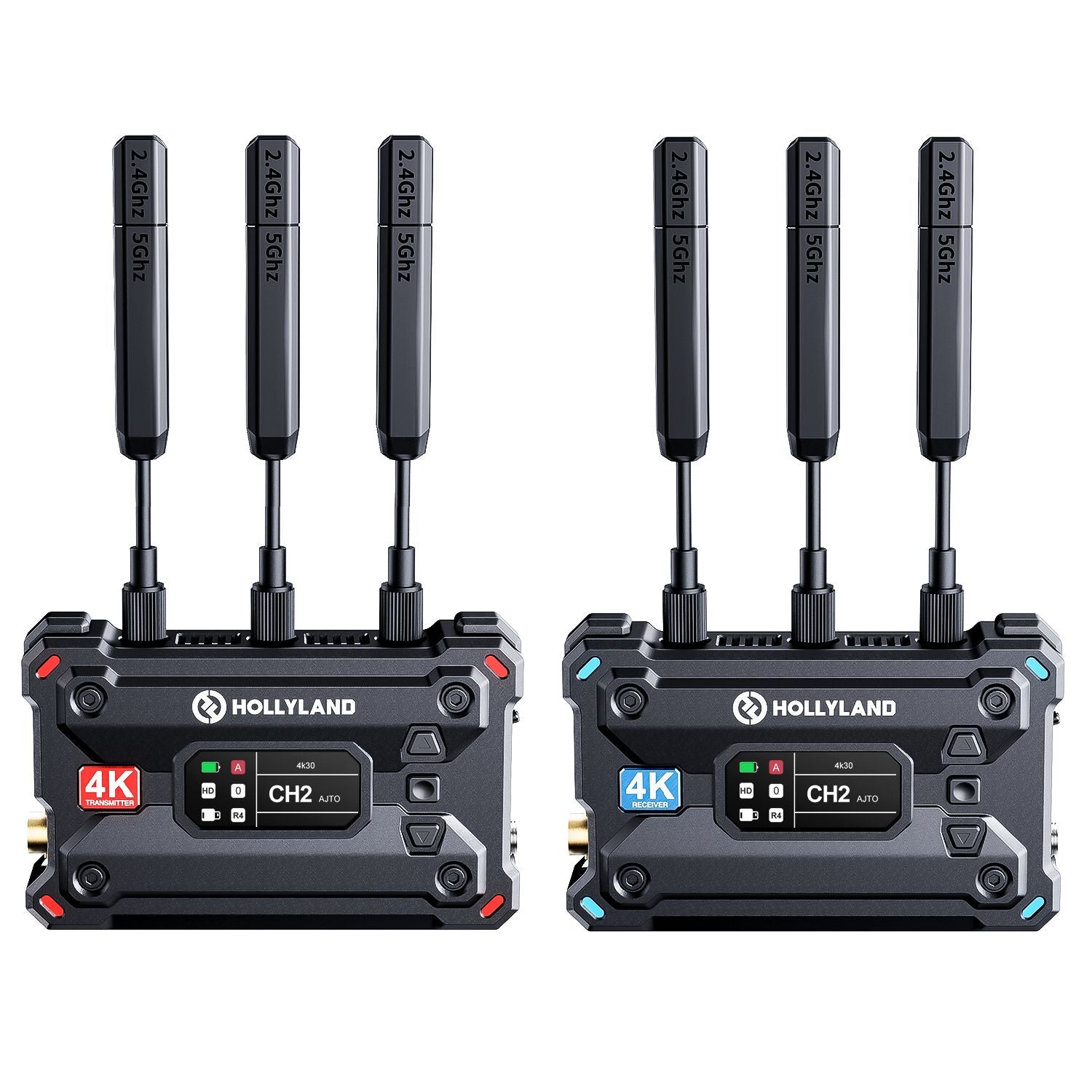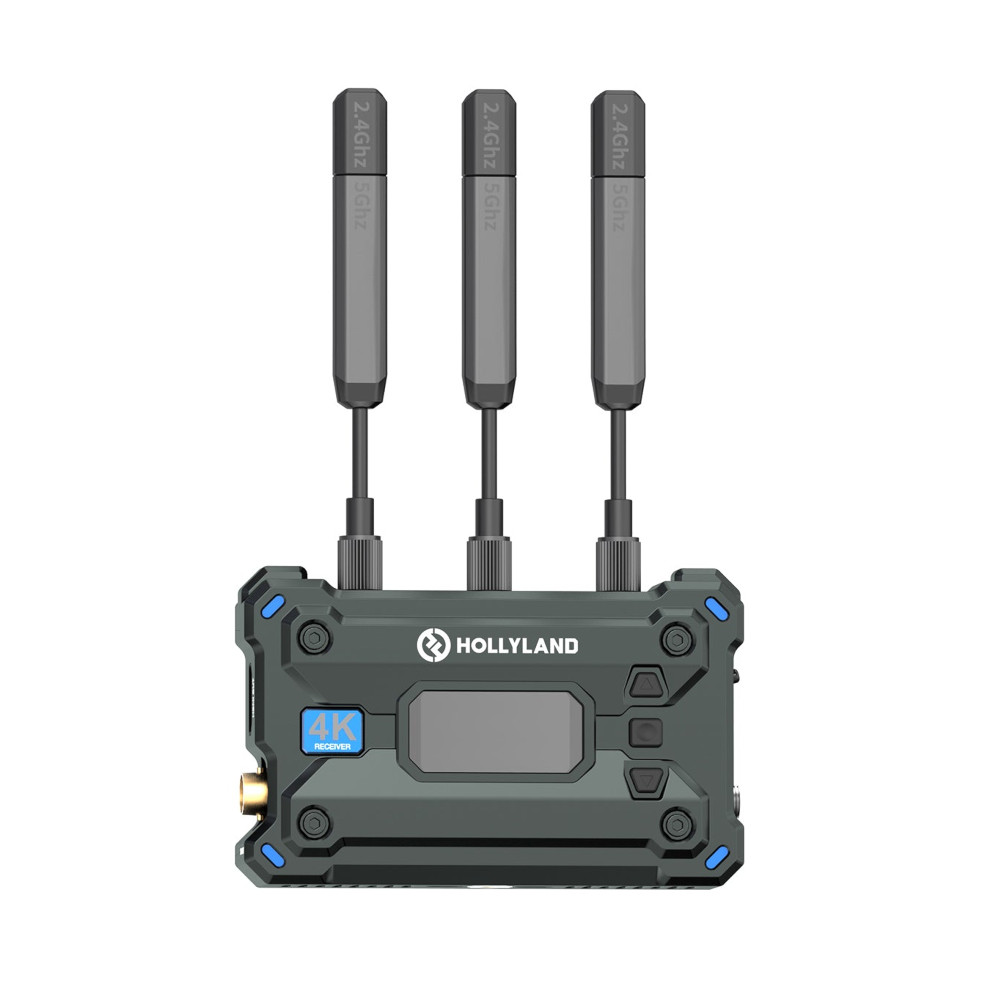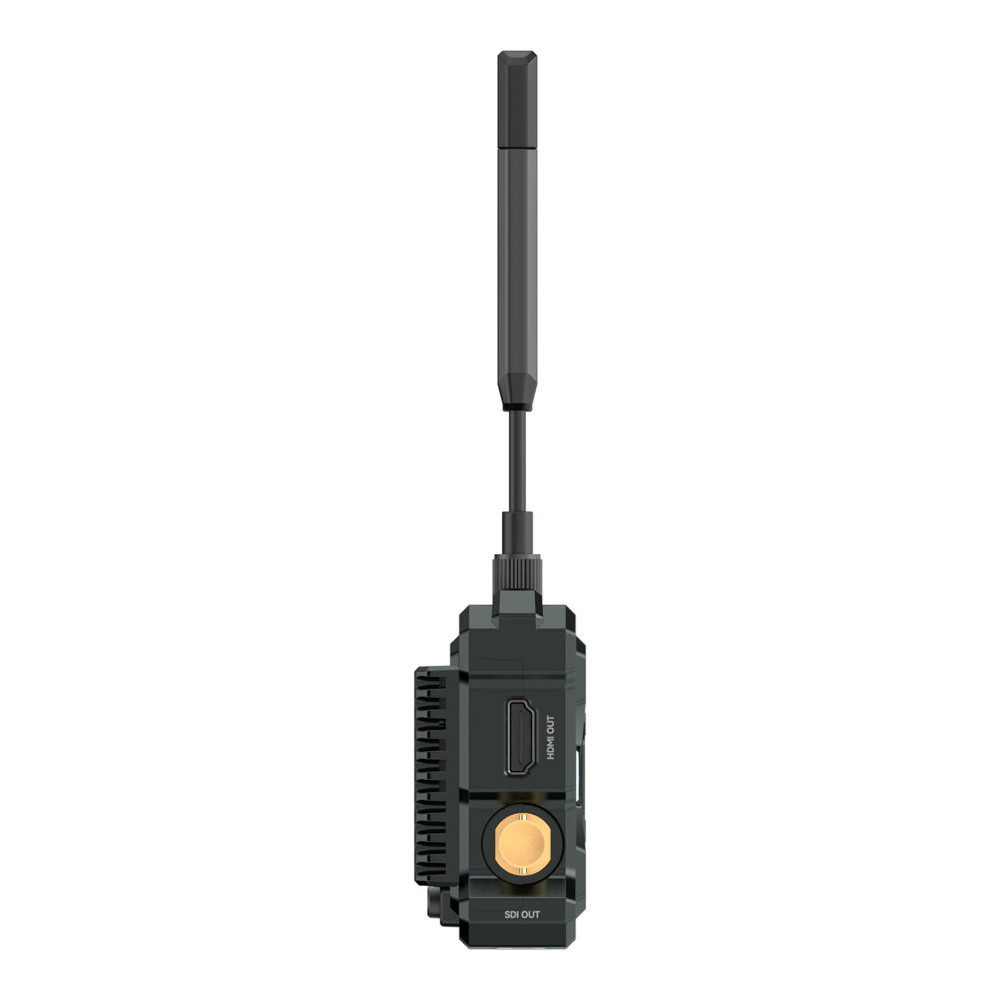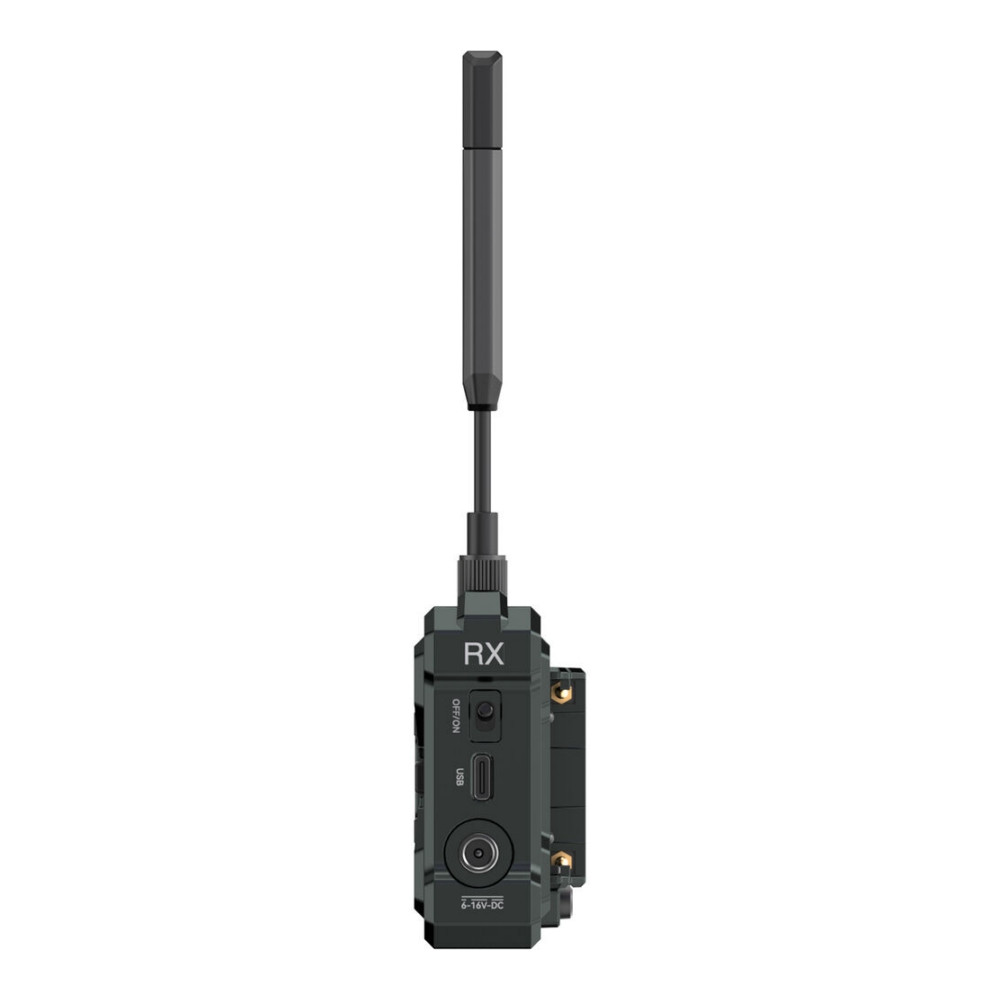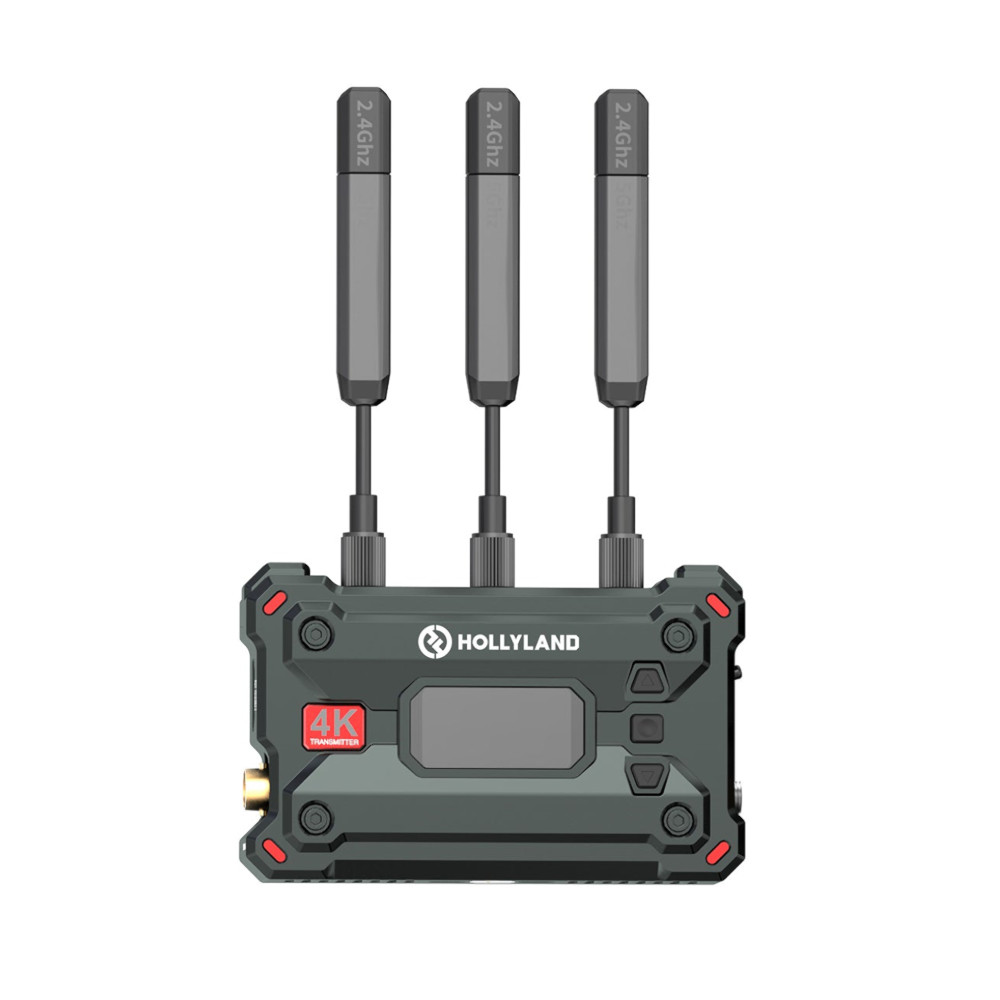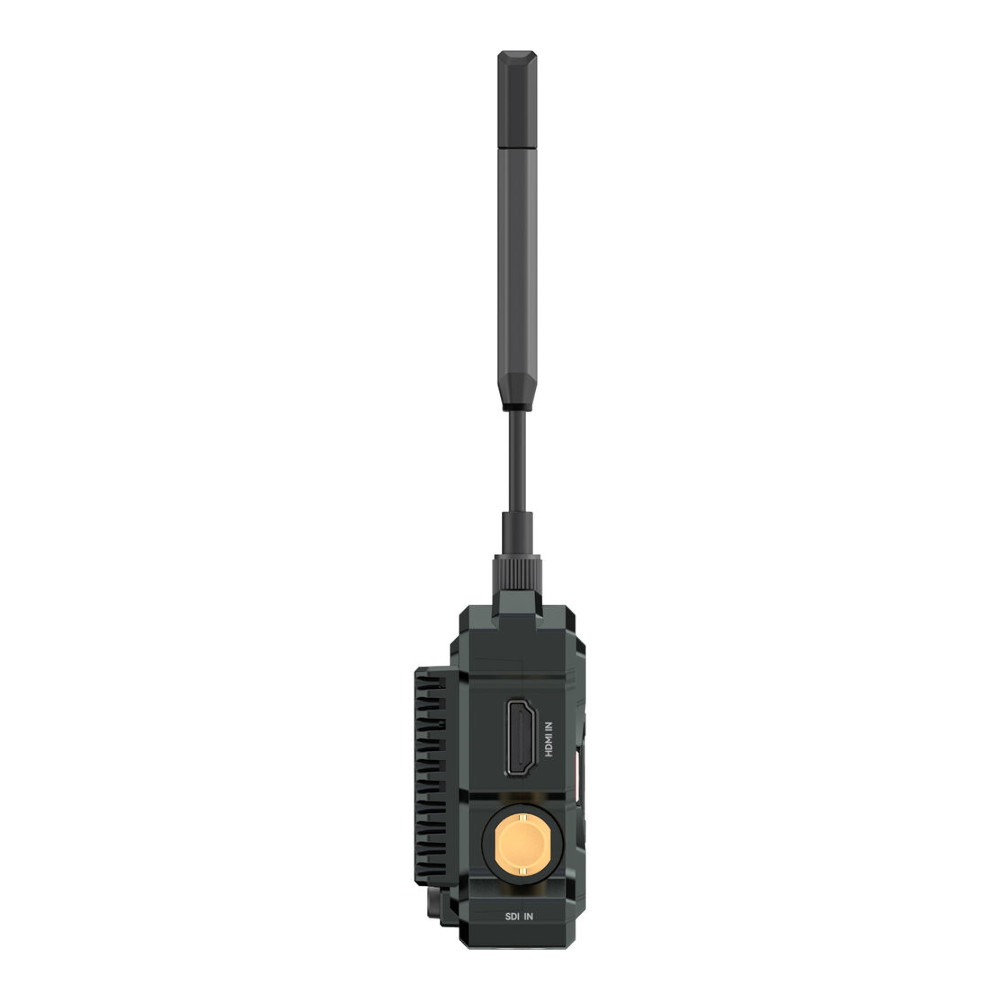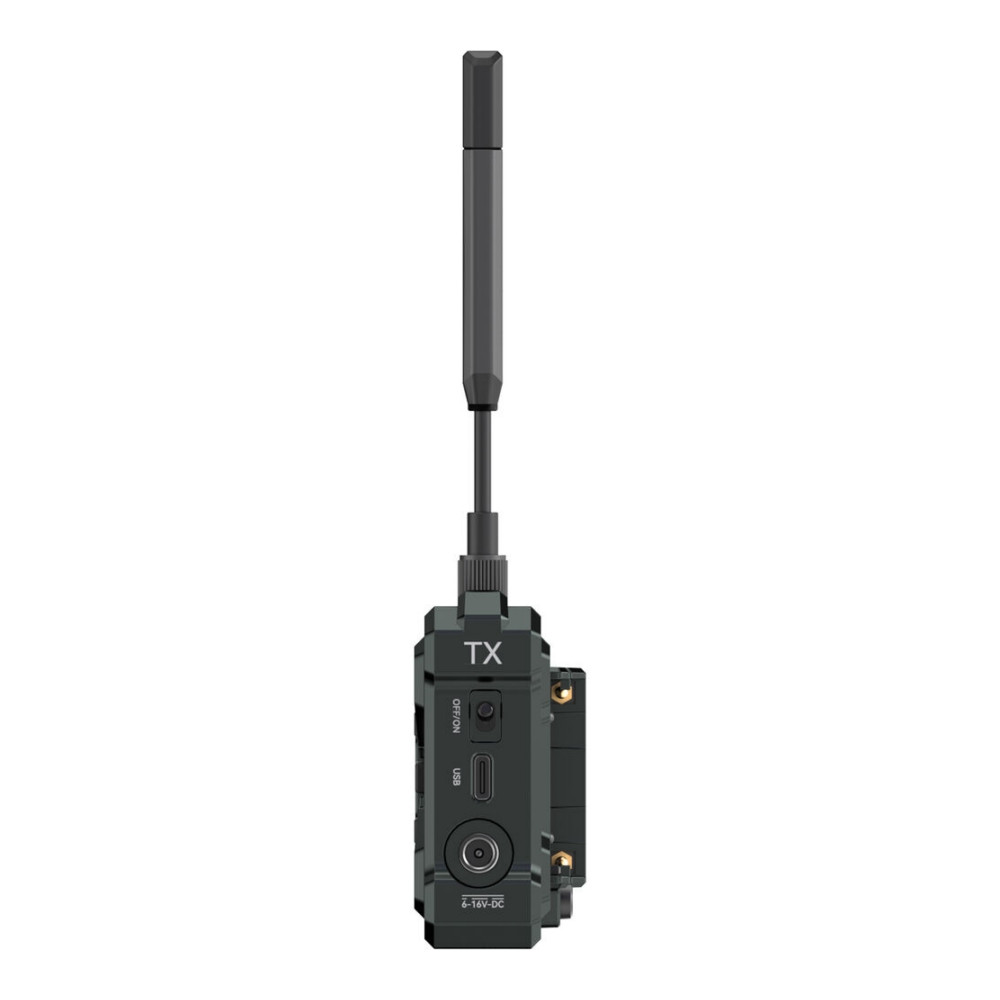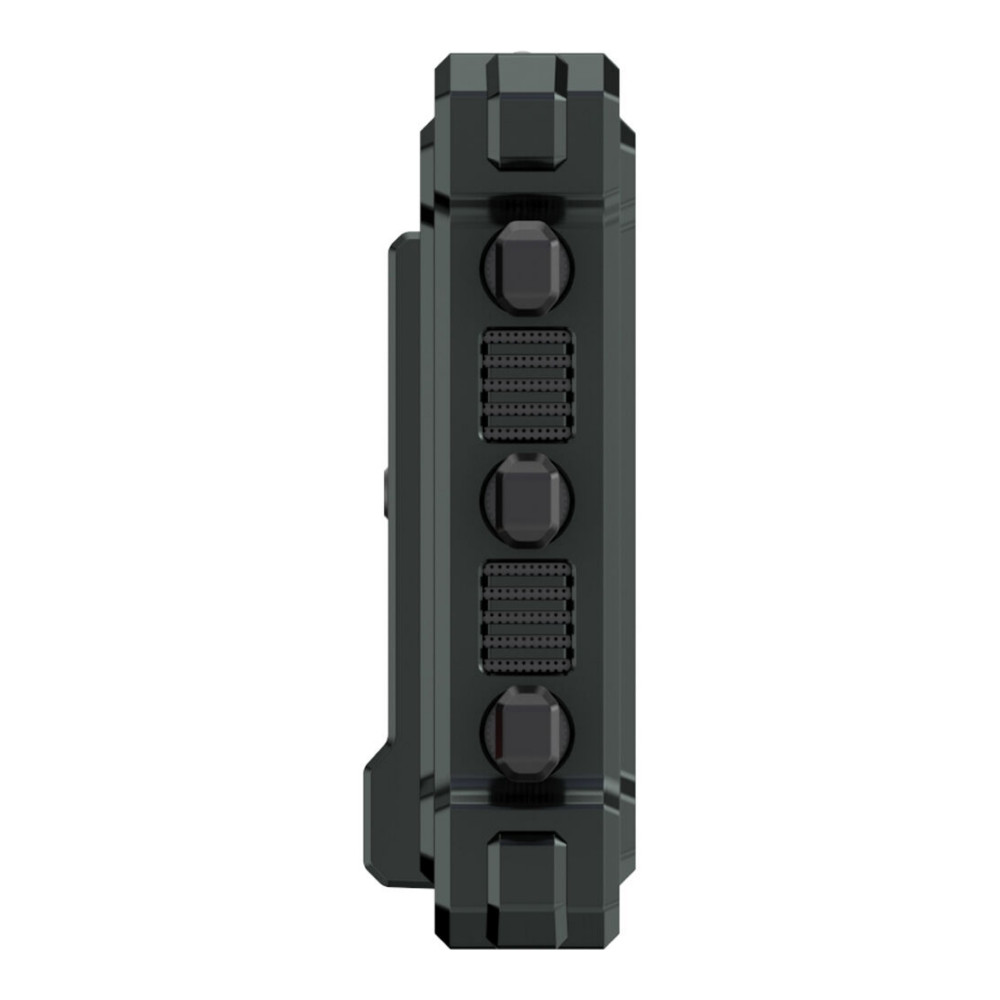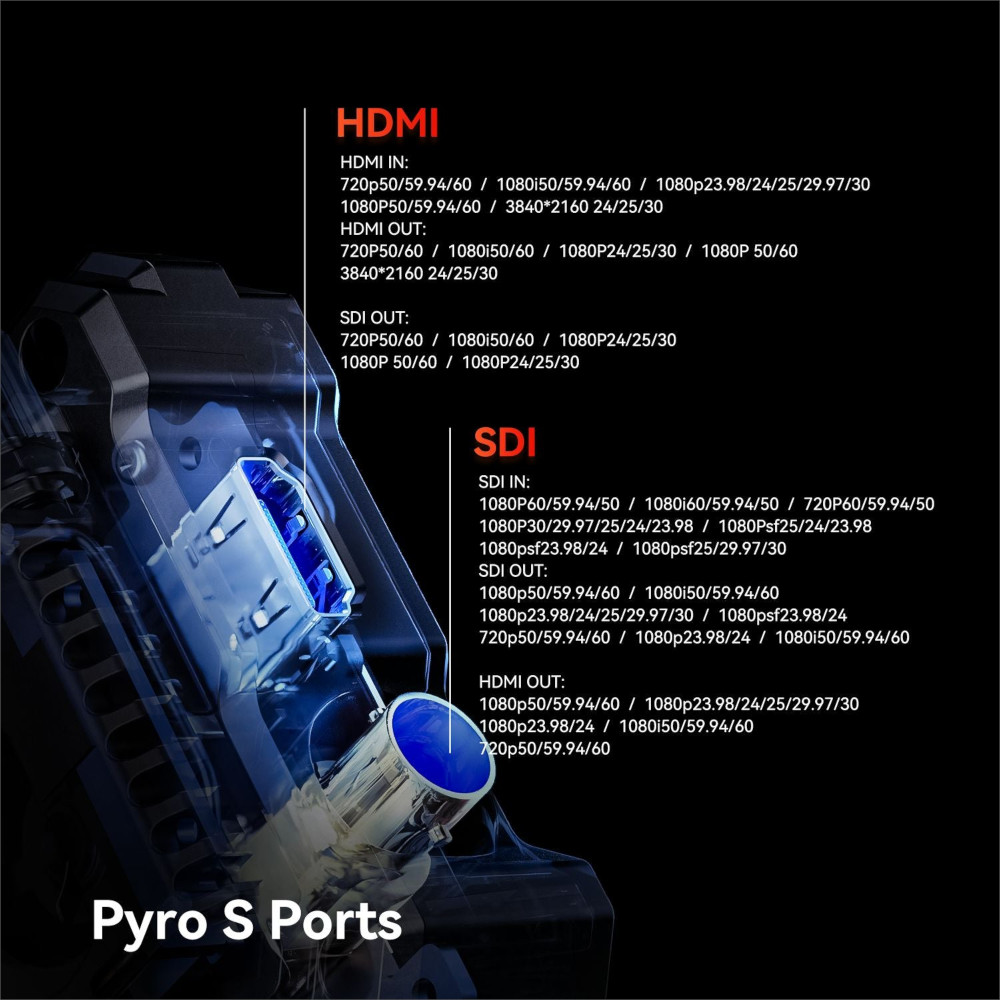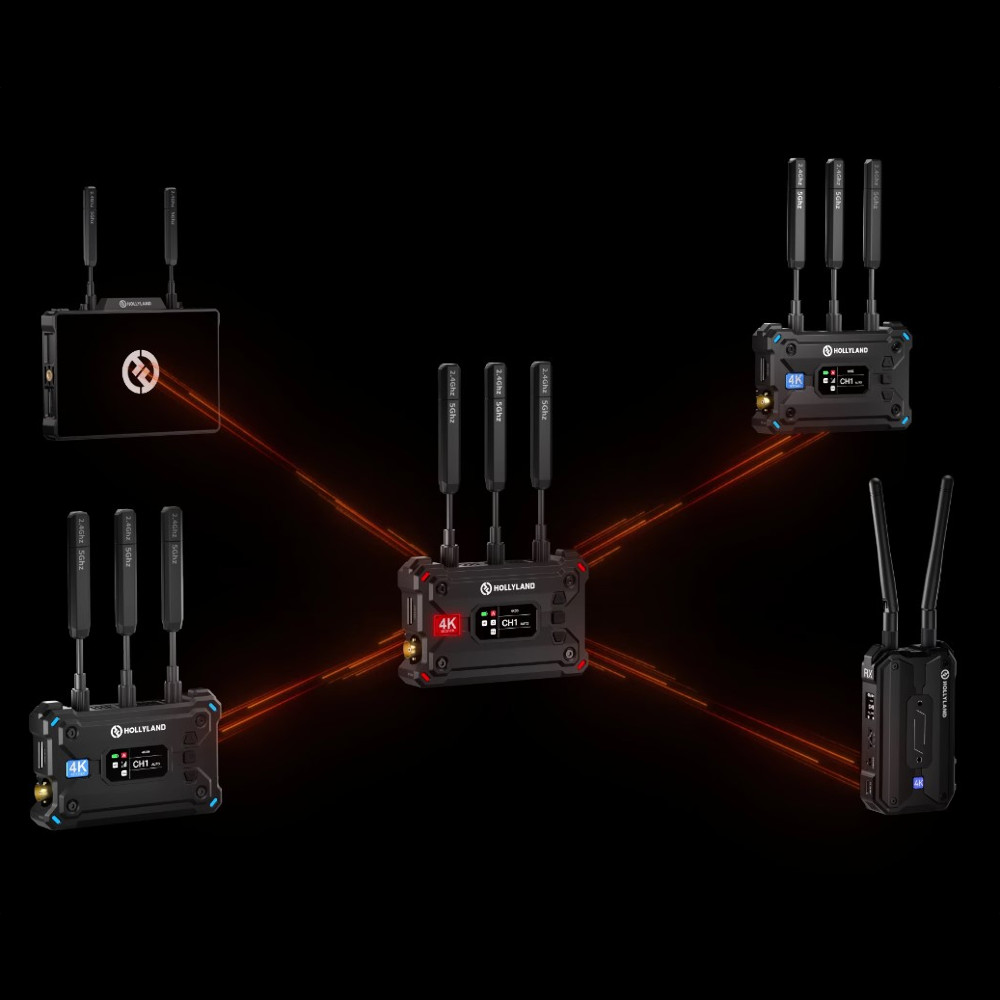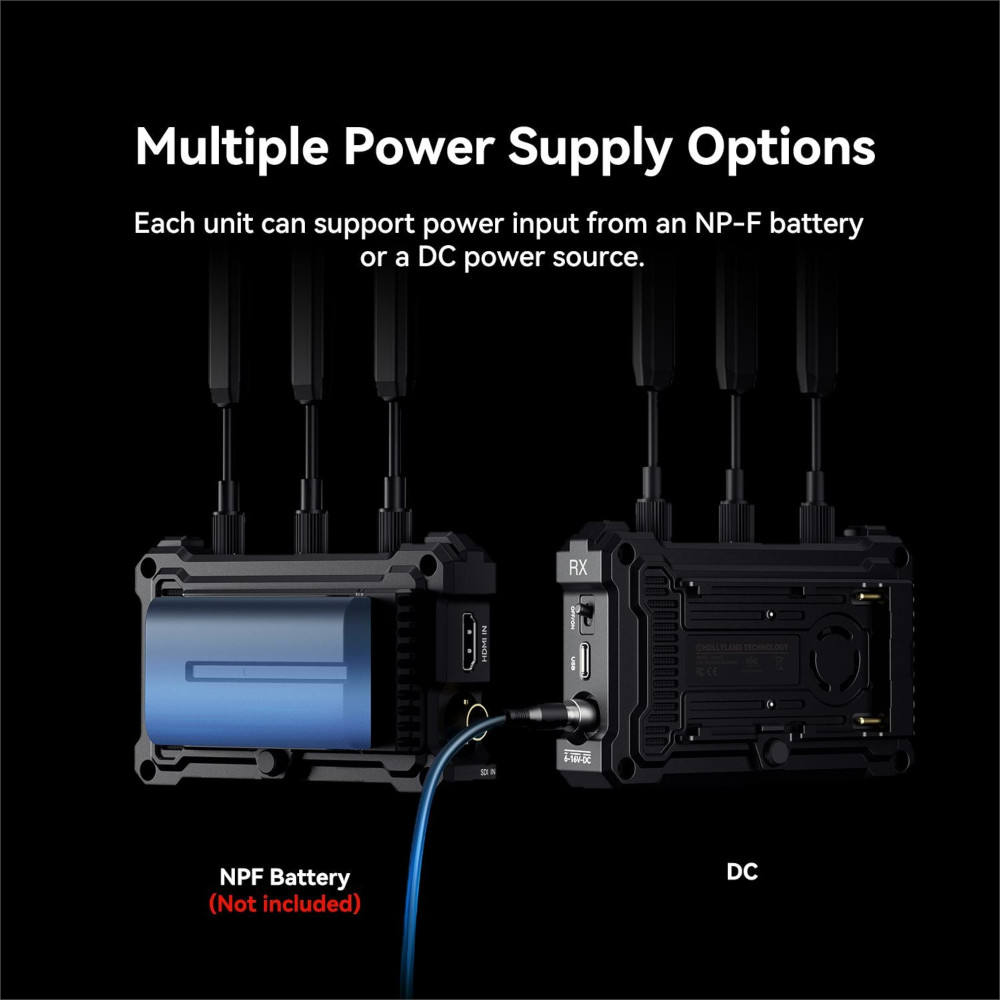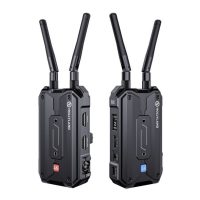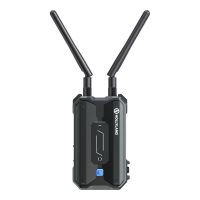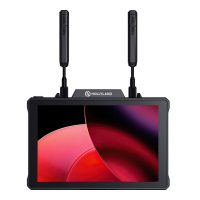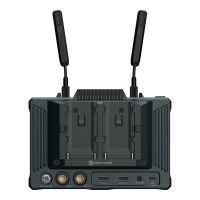Hollyland Pyro S SDI and HDMI Video Transmission System
From: 349.00 USD
Hollyland Pyro S — Supports HDMI and SDI input/output and can transmit to up to four receivers simultaneously, with a range of up to 1,300ft (400m) and minimal latency of just 50ms.
Description
Hollyland Pyro S SDI and HDMI Video Transmission System
Hollyland Pyro S — Supports HDMI and SDI input/output and can transmit to up to four receivers simultaneously, with a range of up to 1,300ft (400m) and minimal latency of just 50ms. With 4k/30fps transmission capabilities, Pyro S presents images with superior clarity, detail, and realism, making it competent for professional applications, such as filmmaking.
Pyro S uses advanced Auto Dual-Band Hopping (ADH) technology to ensure reliable transmission and features selectable modes for your real-world shooting needs. Lighter and more durable than traditional models, Pyro S’s magnesium alloy shell makes it easier to carry and handle. It’s ideal for multi-user monitoring in dynamic shooting scenarios, such as film production, live events, and ENG/EFP applications.
Features
- 1 Transmitter & 4 Receivers: Offers more flexibility when additional monitoring needs emerge on set
- 1,300ft (400m) LOS Range: Ultra-long range wireless transmission capability
- 0.05s Low Latency: Excels with increased ltransmission distance while preserving video quality and minimizing latency
- 2.4GHz & 5GHz Dual Band: Provides better signal transmission performance and efficiency
- Multiple Power Supply Options: Offers versatility, reliability, and convenience
- UVC & RTMP Streaming: Suitable for streaming live content from local sites to global audiences
- 4K30 Transmission: Presents images with superior clarity, detail, and realism
- Ready Out of the Box: Preset grouping eliminates the need for tedious setup
Pyro S Overview
Pyro S’s WifiBroadcast technology enables one transmitter to connect to four receivers with stable signals, offering more flexibility when additional monitoring needs emerge on set.
Hollyland’s proprietary 2.4 GHz & 5 GHz Dual-Band technology provides the Pyro S system with a stable transmission range of up to 1,300ft (400m). It achieves a minimal transmission latency of 50ms thanks to upgraded chips and optimized video encoding/decoding algorithms. This Dual-Band tech addresses common issues such as signal interference, low transmission efficiency, and frequency congestion. And the omnidirectional high-gain antennas also ensure stable signals in all directions. This provides better signal transmission performance and efficiency. With Pyro S, you no longer have to worry about video drop issues.
Pyro S is the perfect solution for professional shooting and smaller commercial projects. The transmitter features one HDMI input and one SDI input, while the receiver provides one SDI output and one HDMI output.
Auto Dual-Band Hopping (ADH) technology allows Pyro S to operate on both 2.4 GHz and 5 GHz dual-bands and features intelligent Auto Frequency Hopping, so it can automatically choose the clearest channel. This feature guarantees reliable and uninterrupted wireless video transmission.
Upon startup, Pyro S automatically chooses a high-quality frequency channel, optimizing the user experience from the outset. Additionally, users can activate the smart channel scan function on the receiver to view real-time feedback on the frequency status, thus ensuring an uninterrupted and reliable experience.
Pyro S supports preset grouping and pairing, obviating the need for users to repetitively and manually set up the transmitter and receivers. Time really matters to crew members.
With Broadcast mode activated, the transmitter can transmit signals to a max of four receivers. With Broadcast mode deactivated, the transmitter can transmit signals to at most two receivers and two mobile devices. Please note: Connection to the monitoring app may affect the transmission range.
The Pyro S has dual mode operation to fulfill a variety of needs:
Smooth Mode
The bitrate dynamically adjusts in this mode to achieve the lowest 60ms latency for ultra-long-distance transmission.
HD Mode
Optimal for superior image quality. HD Mode guarantees clear visuals, maintaining a stable bitrate of 8-12 Mbps even at a range of 1,300ft (400m).
The Pyro S system also features UVC (USB Video Class) that offers seamless compatibility with a wide range of devices, such as computers, without requiring capture cards or software installations. This plug-and-play feature simplifies setup and operation, making it convenient for users in various scenarios, such as live streaming and video conferencing.
With RTMP (Real-Time Messaging Protocol), just input your wireless key and connect your USB Wi-Fi dongle to easily stream video to popular live broadcasting or conferencing platforms like Zoom, YouTube Live, Twitch, TikTok Live, and others. Pyro S will offer you a straightforward and convenient live streaming experience. (Please note: Some network card models may not be compatible.)
The shell of Pyro S is made of aerospace-grade magnesium-aluminum alloy, which is more robust, rigid, 30% lighter, and better at heat dissipation than aluminum-only models. The two-speed fan adjustment cooling system helps to regulate device temperature, preventing overheating and ensuring stable signal transmission. In Auto Mode, the device automatically adjusts the fan speed based on its temperature, ensuring effective heat dissipation. In Low-Speed Mode, the fan operates at the lowest speed, reducing noise generation. This mode is suitable for environments where low noise levels are required.
The LCD display on both units offers vibrant, vivid colors and an easy-to-read interface. With it, you can monitor the status and setting information, including battery level, current group, transmission resolution, frame rate, current channel, and more.
Each unit can support power input from an NP-F battery or a DC power source.
Specifications
<style>table, th, td {border: 1px solid black; border-collapse: collapse;}</style>
<table cellspacing=”0″ border=”0″>
<colgroup width=”303″></colgroup>
<colgroup width=”588″></colgroup>
<tr>
<td height=”133″ align=”left” data-sheets-value=”{ "1": 2, "2": "Port"}”><b>Port</b></td>
<td align=”left” data-sheets-value=”{ "1": 2, "2": "DC Input: 2.0mm Core Socketu000aHDMI Input: HDMI 1.4bu000aSDI Input: 3G SDIu000aUSB-C: USB 2.0u000aOTG Antenna: SMA Male"}”>DC Input: 2.0mm Core Socket<br>HDMI Input: HDMI 1.4b<br>SDI Input: 3G SDI<br>USB-C: USB 2.0<br>OTG Antenna: SMA Male</td>
</tr>
<tr>
<td height=”55″ align=”left” data-sheets-value=”{ "1": 2, "2": "Power Supply"}”><b>Power Supply</b></td>
<td align=”left” data-sheets-value=”{ "1": 2, "2": "Battery Voltage Range: 6.8 – 8.4Vu000aDC Voltage Range: 6 – 16V"}”>Battery Voltage Range: 6.8 – 8.4V<br>DC Voltage Range: 6 – 16V</td>
</tr>
<tr>
<td height=”55″ align=”left” data-sheets-value=”{ "1": 2, "2": "Power Consumption"}”><b>Power Consumption</b></td>
<td align=”left” data-sheets-value=”{ "1": 2, "2": "TX: < 11Wu000aRX: < 8W"}”>TX: < 11W<br>RX: < 8W</td>
</tr>
<tr>
<td height=”30″ align=”left” data-sheets-value=”{ "1": 2, "2": "Net Weight"}”><b>Net Weight</b></td>
<td align=”left” data-sheets-value=”{ "1": 2, "2": "207g"}”>207g</td>
</tr>
<tr>
<td height=”30″ align=”left” data-sheets-value=”{ "1": 2, "2": "Dimensions"}”><b>Dimensions</b></td>
<td align=”left” data-sheets-value=”{ "1": 2, "2": " L × W × H: 112 × 71.2 × 34.1mm (4.4 × 2.8 × 1.3in.)"}”> L × W × H: 112 × 71.2 × 34.1mm (4.4 × 2.8 × 1.3in.)</td>
</tr>
<tr>
<td height=”369″ align=”left” data-sheets-value=”{ "1": 2, "2": "Input/Output Format"}”><b>Input/Output Format</b></td>
<td align=”left” data-sheets-value=”{ "1": 2, "2": "HDMI Inputu000a720p50/59.94/60u000a1080i50/59.94/60u000a1080p23.98/24/25/29.97/30u000a1080p50/59.94/60u000a3840*2160 30/25/24/29.97/23.98u000au000aSDI Inputu2028u000a1080p60/59.94/50u2028u000a1080i60/59.94/50u2028u000a1080p30/29.97/25/24/23.98u2028u000a720p60/59.94/50u2028u000a1080psf23.98/24 1080psf25/29.97/30u000a1080i50/59.94/60"}”>HDMI Input<br>720p50/59.94/60<br>1080i50/59.94/60<br>1080p23.98/24/25/29.97/30<br>1080p50/59.94/60<br>3840*2160 30/25/24/29.97/23.98<br><br>SDI Input
<br>1080p60/59.94/50
<br>1080i60/59.94/50
<br>1080p30/29.97/25/24/23.98
<br>720p60/59.94/50
<br>1080psf23.98/24 1080psf25/29.97/30<br>1080i50/59.94/60</td>
</tr>
<tr>
<td height=”212″ align=”left” data-sheets-value=”{ "1": 2, "2": "Operating Frequency"}”><b>Operating Frequency</b></td>
<td align=”left” data-sheets-value=”{ "1": 2, "2": "5 GHz Frequency Bandu2028u000a5.150 – 5.250 GHz u2028u000a5.250 – 5.350 GHz u2028u000a5.470 – 5.725 GHzu2028u000a5.725 – 5.850 GHzu2028u000au000a2.4 GHz Frequency Bandu2028u000a2.412 – 2.484 GHz"}”>5 GHz Frequency Band
<br>5.150 – 5.250 GHz
<br>5.250 – 5.350 GHz
<br>5.470 – 5.725 GHz
<br>5.725 – 5.850 GHz
<br><br>2.4 GHz Frequency Band
<br>2.412 – 2.484 GHz</td>
</tr>
<tr>
<td height=”30″ align=”left” data-sheets-value=”{ "1": 2, "2": "Transmit Power"}”><b>Transmit Power</b></td>
<td align=”left” data-sheets-value=”{ "1": 2, "2": "< 23 dBm"}”>< 23 dBm</td>
</tr>
<tr>
<td height=”55″ align=”left” data-sheets-value=”{ "1": 2, "2": "Receiver Sensitivity"}”><b>Receiver Sensitivity</b></td>
<td align=”left” data-sheets-value=”{ "1": 2, "2": "-85 dBm (Broadcast: -80 dBm)u000a"}”>-85 dBm (Broadcast: -80 dBm)<br></td>
</tr>
<tr>
<td height=”30″ align=”left” data-sheets-value=”{ "1": 2, "2": "Latency"}”><b>Latency</b></td>
<td align=”left” data-sheets-value=”{ "1": 2, "2": "as low as 50ms"}”>as low as 50ms</td>
</tr>
<tr>
<td height=”30″ align=”left” data-sheets-value=”{ "1": 2, "2": "Bandwidth"}”><b>Bandwidth</b></td>
<td align=”left” data-sheets-value=”{ "1": 2, "2": "20 MHz (Broadcast: 40 MHz)"}”>20 MHz (Broadcast: 40 MHz)</td>
</tr>
<tr>
<td height=”55″ align=”left” data-sheets-value=”{ "1": 2, "2": "Working Temperature"}”><b>Working Temperature</b></td>
<td align=”left” data-sheets-value=”{ "1": 2, "2": "-10 – 45℃ (working)u000a-40 – 60℃ (storage)"}”>-10 – 45℃ (working)<br>-40 – 60℃ (storage)</td>
</tr>
</table>
Related Products
Product Categories
- Bargain Bin
- Books
- Boom Poles
- Cables & Adapters
- Camera Interfaces
- Cases, Bags & Harnesses
- Clearance
- Communications
- Connectors
- Expendables
- Featured
- Headphones
- Holiday Clearance
- In-Ear-Monitors
- Interfaces
- Microphones & Accessories
- Mixers
- Motorola
- NAGRA
- Podcast
- Power Solutions
- PPE
- Press Boxes
- Pro Audio Converters
- Pro Video
- Recorders
- Slates & Timecode
- Sound Carts
- Trew Merchandise
- Uncategorized
- Used
- Walkie-Talkies
- Wireless


 US
US  Canada
Canada 